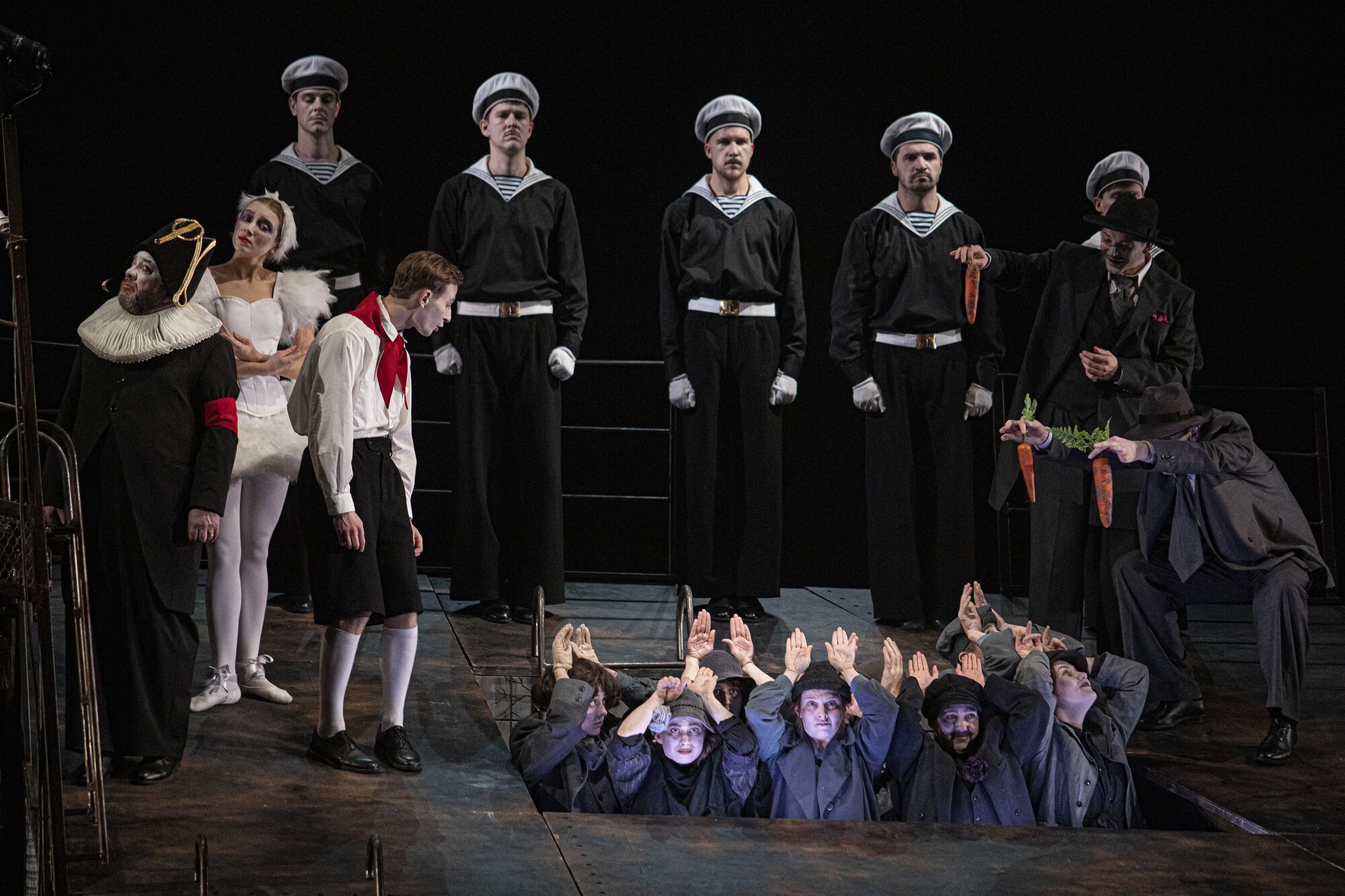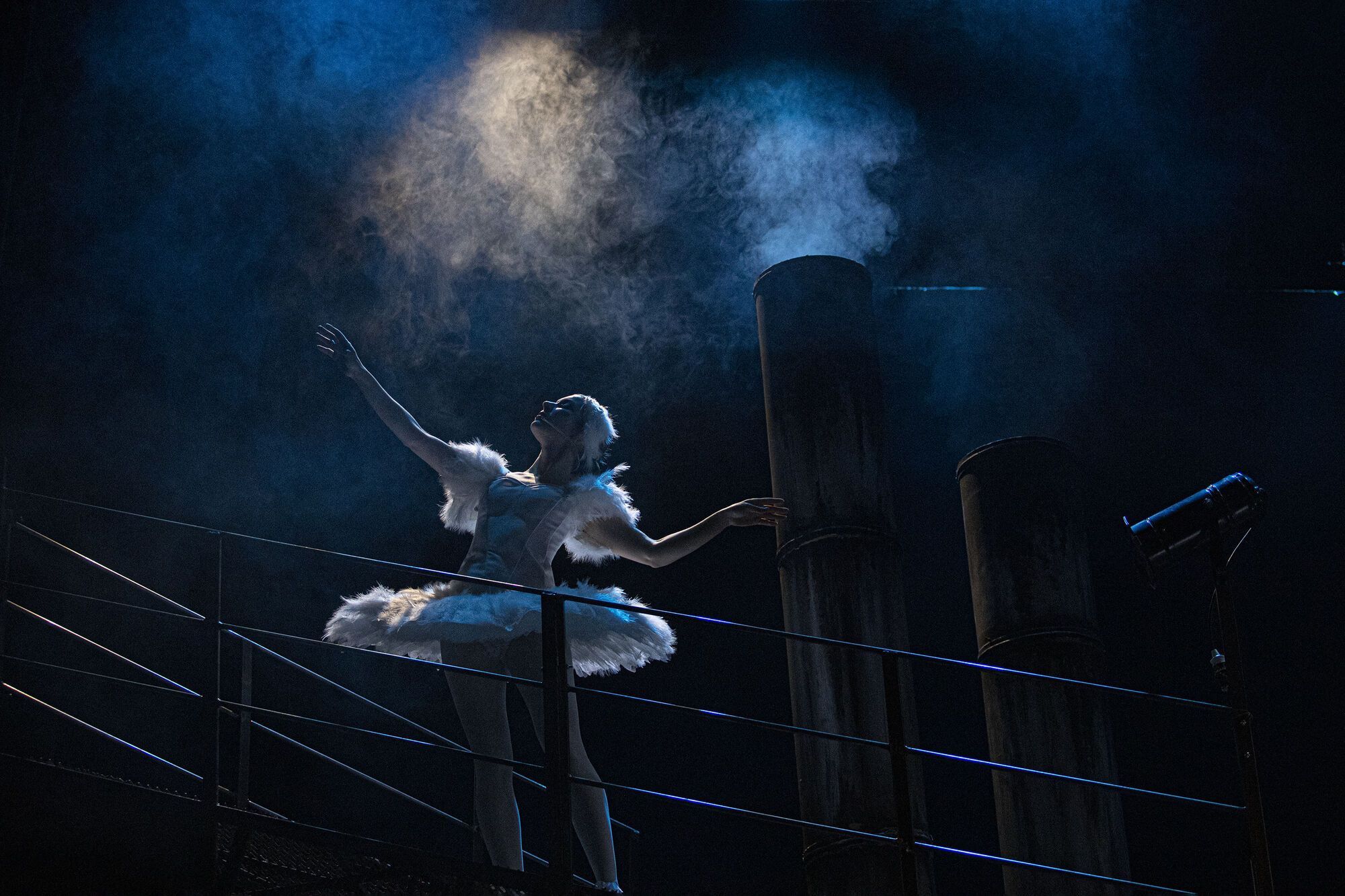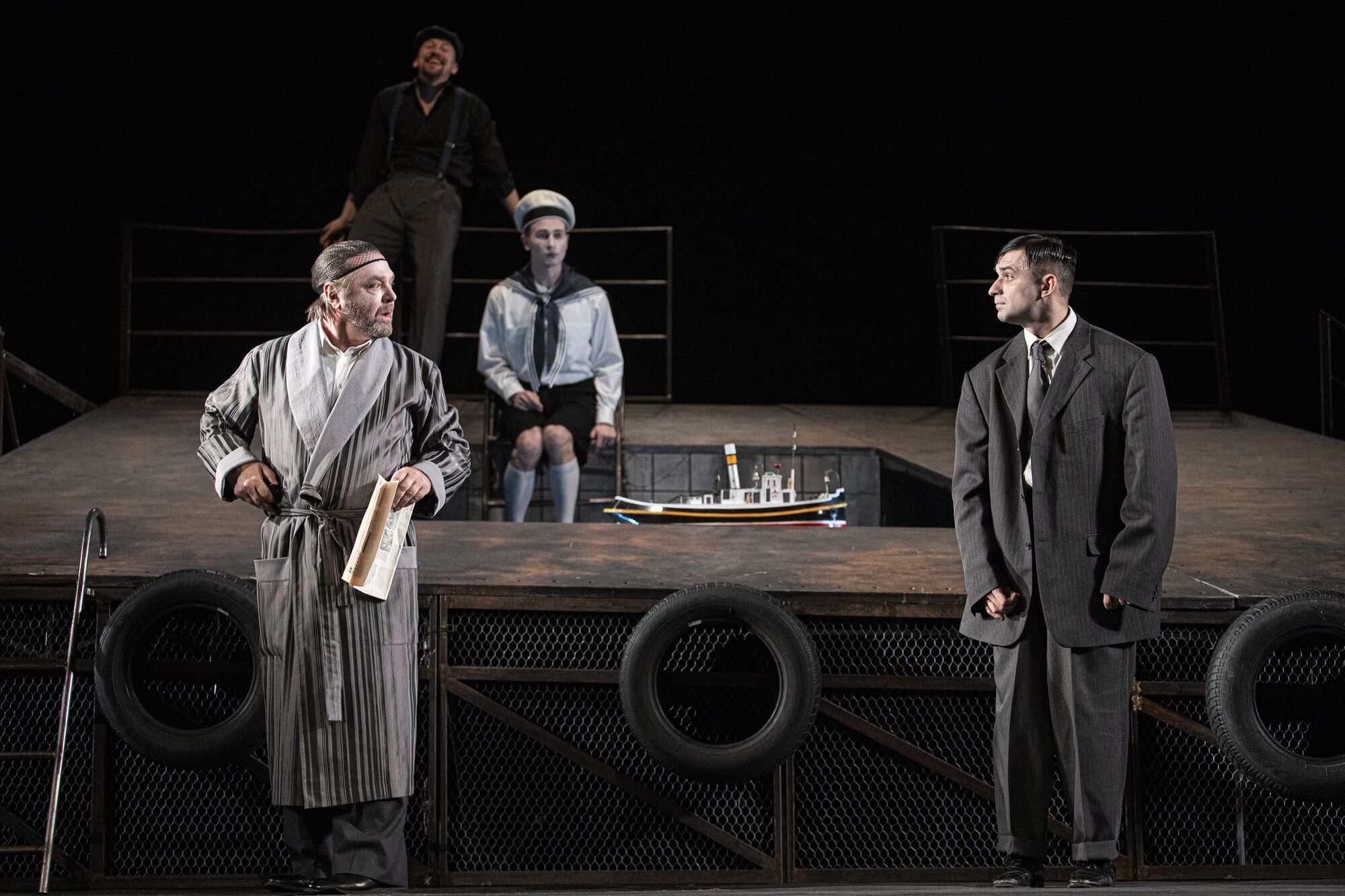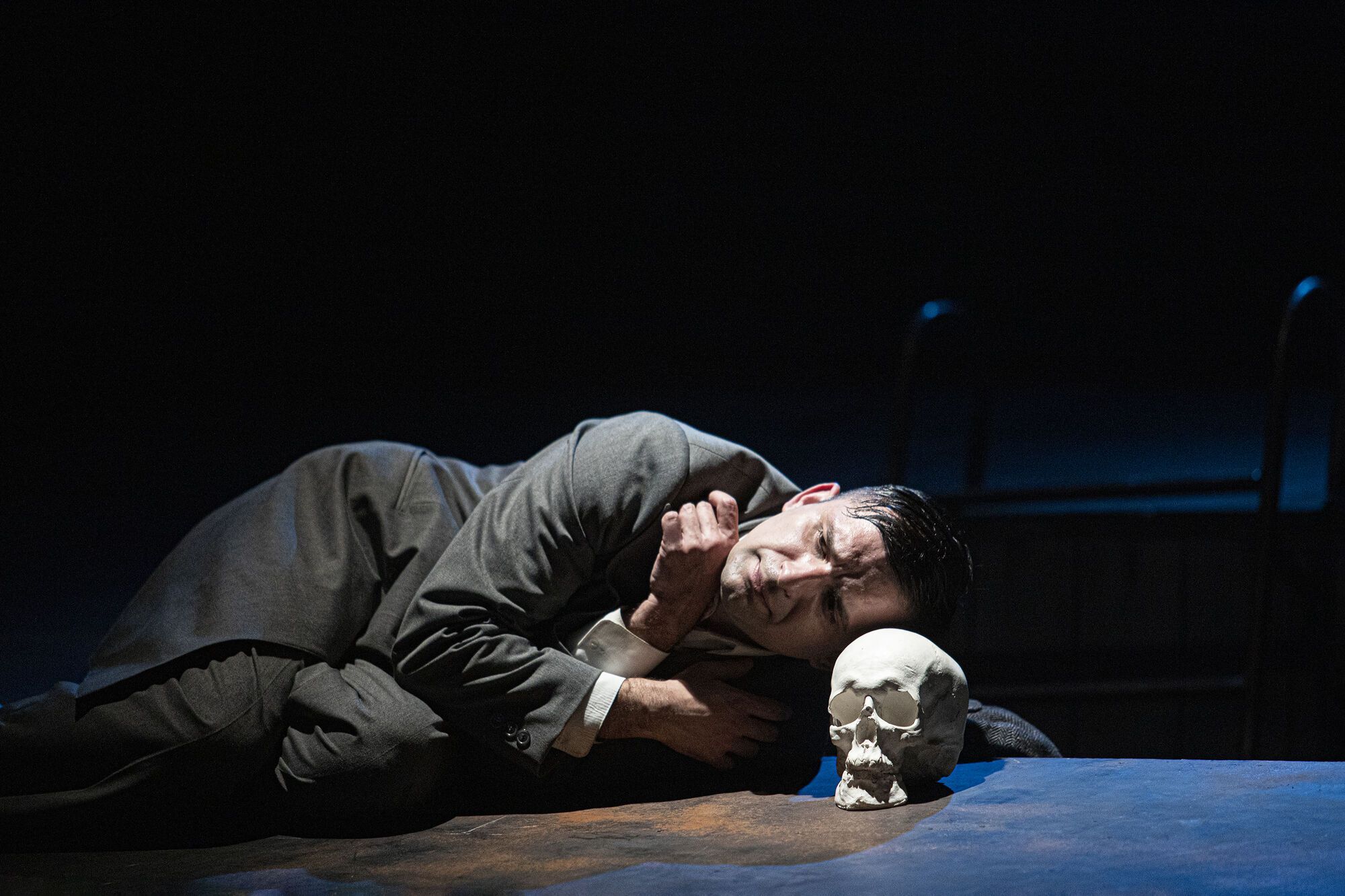Entertainment
A good German about bad dictators
Title/author: The Career of Arturo Ui. Bertolt Brecht
Theater: Ivan Franko National Drama Theater
Director: Dmytro Bohomazov
"The Resistible Rise of Arturo Ui," a grand-scale gangster production by the Ivan Franko National Drama Theater, is an attempt to comprehend the dictatorial rise to the top of power. In the success story of the Chicago gangster, pieces of biographies of both the German and modern Russian leaders can be discerned. However, the more monstrous the image of the tyrant becomes, the less his supporters seem concerned about personal responsibility.
For postwar Europe, the playwright Bertolt Brecht is a "good German." Expelled from his homeland by the Nazi regime, Brecht bears the cross of a pacifist and a citizen of the world. Austria, Switzerland, Denmark, the USSR, Finland, the United States... Everywhere he is unwelcome, both for the Moscow Art Theater and for Hollywood. After fifteen years of wandering, the playwright would return to a country that banned the printing of his works and burned his books. The gangster play "The Resistible Rise of Arturo Ui" is an allegorical attempt to understand how the predatory leader climbed to the top of the food chain over the heads of his associates and held his subjects hostage with "threats, blackmail, and pogroms." But Ui's career is also a vindication of the German people, "whose hatred of Hitler is only because he lost the war."
No one popularized the image of Brecht's "good German" more than the Soviet Union. Brecht lived here for a short time, contemplating the idea of obtaining Soviet citizenship. During his stay, his plays were republished in Russian, and he received the Stalin Prize. This recognition served as a form of gratitude for Brecht choosing the "correct" East Germany upon his return.
For his proletarian ideas and favorable stance towards communism, Brecht faced consequences in exile, akin to the challenges he encountered for opposing fascism in his native Germany. There was a joke circulating in Los Angeles that Brecht was not hired because there were fears that he would not encourage the formation of a labor union. Brecht's directorial concepts, known as "epic theater," aimed at appealing to the mass audience, in contrast to the elite "theater of experience." This is reflected in the abundance of ballet in Brecht's works: dancing, singing, narrator's voiceover, typicality, and generalization of characters.
"The Career of Arturo Ui" revolves around this concept of "typicality." Brecht posits that an individual inherently predisposed to criminal behavior will act as such, regardless of the scale of their atrocities. Whether in a vegetable market in Chicago or Germany during the Third Reich, the actions of someone inherently corrupt will be equally reprehensible. This is why Brecht draws parallels between a fictional racketeer terrorizing cabbage sellers at the beginning of his "career" and a World War I veteran who convened meetings with revengeful appeals in beer bars. The gangster employs any means to gain and maintain power: threats, scams, arson, and the murder of witnesses, journalists, and friends. Similarly, the Fuhrer did not shy away from pogroms and party purges.
To enhance the analogy between Ui and Hitler, director Dmytro Bohomazov introduces another character, a KGB agent with the call sign "Moth," who shares an affinity for East Germany. The production includes several references to the Russian dictator's biography: the unexpected transfer of power reminiscent of "I'm tired, I'm leaving," the vegetable market set ablaze by Ui, echoing the story of hexagonal high-rise buildings, and the final SOS pulsating from the depths of the Barents Sea with "she drowned."
Everything seems logical: if citizens are indoctrinated for twenty years with "threats, blackmail, and pogroms," a nation of subjects with Stockholm syndrome is likely to emerge. However, the tyrant-victim relationship is not solely about the strong taking from the weak. It also involves how a tyrant bestows their love, and the subject willingly surrenders to its weight. For the tyrant, the whip is merely an attribute, a symbol of the right to what already belongs to them by the will of the stronger.
The German Fuhrer promised his countrymen the revenge of the Aryan race, assuring them that all the blood of the divinely chosen Teutons was not in vain poured out on the fields of the First World War. The Kremlin Fuhrer warms his subjects with promises of a happy "Eurasian" future, for the sake of which all the rot of Russian modernity must be endured. Faith in the Fuhrer rests on the desire of the crowd to share his ideas. It is not an evil sorcerer who makes people do evil. These are the words of someone who will be called a sorcerer after the massacre, and they resonate in the hearts of "innocent" criminals.
However, you don't believe Arturo Ui. All his words about wealth are outright fraud, and his tirades about protection are racketeering threats. He himself and any trader in the market understand this. It turns out that all of Ui's success is due to a lucky alignment of stars, the so-called "gangster's luck." He met the right gangster friends at the right time, helped businessmen at the right time, and entered politics at the right time. The only thing that Ui did well was to betray his friends before they betrayed him. Thus, this becomes a story about a functionary man, and if it weren't for Ui, there would have been another accomplice in his place. This is why the characters seem stereotypical, like poster children, and fail to evoke much sympathy or empathy.
The production also lacks a full-fledged conflict. The story of Arturo Ui itself is akin to the observation of Eve's temptation by the serpent in Eden: how cunning surpasses physical strength, wealth, and political influence. You know in advance that the serpent will persuade the woman to bite into the forbidden fruit, but it is the sophistication of the serpent's attacks and Eve's counterarguments that interest you. However, the figure of the fortunate Ui appears so invincible that any resistance to the gangster does not cause the slightest harm. At the same time, Ui acts with the most primitive methods: he burns down the market, kills witnesses, intimidates, and even rapes oppositionists. So crude that if this were genuinely a story about a biblical serpent, the viper would have shoved an apple into the mouth of a sleeping Eve without any further ado. It would still be the right of the strong!
Presented on the main stage of the Franko Theater, the play offers numerous delights for the audience. This includes Brechtian banter, making it reminiscent of Broadway musicals. There's plenty of singing, with barely any restraint to prevent breaking into mass dance, either as a ship's crew or a testosterone-fueled gang of gangsters. The production also boasts the typical grandiosity of the scenery, this time in the form of the stern of a steamer. The trampoline, although out of view on the proscenium, serves as the main special effect: every time a character disappears overboard, it elicits applause.
The cast is also at the top of their game. When Mykhailo Kukuyuk (The Herald) sings, the women in the audience lose all control and forget about the ban on vocalization. The transformation of Ivan Sharan (Arturo Ui), who in two hours changes from a market racketeer into a political tyrant, is fascinating: his gait, figure, manners, and even voice gradually evolve. Oksana Zhdanova (Betty Dalfit) not only demonstrates the wonders of equilibristics when she walks on the bridges above the stage in heels with the posture of a real lady but also impresses with the skill of "character shift" (only in the opposite vector from Sharan): from a haughty socialite to Ui's trampled victim.
It's scary because it is in this position of a "victim" that a person is capable of stooping to the lowest abomination, justifying their behavior by external influence: I was forced to, orders are not negotiable. It doesn't matter what those orders are about or whether they come from a Berlin or Kremlin bunker. It's not us who are bad; it's the villain who has bewitched us.
Winston Churchill, a member of the anti-Hitler coalition, noted that no snowflake in an avalanche considers itself responsible for the landslide. After all, the easiest way to get rid of remorse is to shift responsibility for one's own sins and crimes onto historical trends or personalized evil, such as the gangster Ui, dictator Hitler, or some other hellish Kremlin figure.































